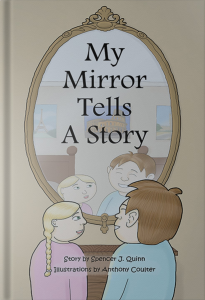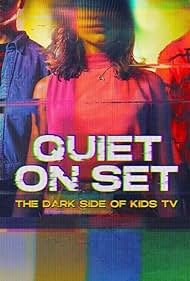Quiet on Set: The Dark Side of Kids TV
I would be lying if I said I try to avoid pop culture, because it really doesn’t take much effort. When you are young, you pick stuff up from being around other young people, and if you are a parent, you pick stuff up from your kids. But I’m old and have no kids, and I find that if you don’t listen to the radio in the car and only watch Turner Classic Movies, it is actually quite easy to completely lose touch with pop culture. I’m perfectly happy having no idea who the latest singers and teen heartthrobs are.
I believe that there is such a thing as being too out of touch with pop culture, however, so if something comes along that everyone is talking about, I sometimes feel duty-bound to check it out and see why it is striking a chord. It’s basically the only reason why I ever watch a movie anymore, since I usually assume that all movies suck nowadays.
The new HBO documentary Quiet on Set: The Dark Side of Kids TV was all over my Twitter/X feed last week, which is about the rise of the children’s programming network Nickelodeon that first began airing in the late 1970s, but which really began to take off in the 1990s. From what I could tell, the whole place was allegedly flooded with pedophiles or something like that. For me, it was more a matter of knowing that it was probably going to have a lot of Jews and pedophiles, and presumably Jewish pedophiles, and thus that I was probably going to be able to get an article out of it.
Quiet on Set is obvious nostalgia-bait for millennials and zoomers given that they would have been Nickelodeon’s target audience during the period of time it covers. The subject matter appealed to me only marginally, given that as a later Gen-Xer, by the time Nickelodeon hit its stride via its original programming in the 1990s, I was already too old for it. Clarissa Explains It All, a sort of proto-iCarley, came out when I was in high school. The show starred Melissa Joan Hart, arguably the first Nickelodeon star break into the mainstream. While Hart is about a year older than me, Clarissa Explains It All was clearly geared towards a middle school audience.
The only Nickelodeon show that made much of an impact on Generation X was the 1980s kids’ sketch-comedy show You Can’t Do That on Television, which wasn’t technically a Nickelodeon show, anyway, as it was made in Canada and then rebroadcast by the network in the United States. It nevertheless became its flagship show. Kids loved it due to its absurdist humor and goofiness, and parents hated it because its humor was extremely lowbrow, with frequent references to words such as “barf” and “boogers.” My own mom forbade me to watch it. In many ways, You Can’t Do That on Television served as a template for the Nickelodeon style. Whereas Disney made shows that kids and parents could watch and enjoy together, Nickelodeon specialized in making content that kids would like but that their parents wouldn’t get.
It wasn’t until decades later that I would learn that You Can’t Do That on Television was a blatant rip-off of Rowan & Martin’s Laugh-In, which had aired from 1968 until 1973. I only realized this when a local station aired a Laugh-In marathon; after 15 minutes, I realized that it was You Can’t Do That on Television with grownups.
Quiet on Set’s bête noire is Dan Schneider. Gen X and older are more likely to know Schneider from the 1980s high-school sitcom Head of the Class, where he played the fat class clown Dennis Blunden, whose various cons and schemes invariably backfired in comedic ways. Schneider scored his first writing credits during his time on Head of the Class, and shortly after its cancellation he was hired by Nickelodeon as a writer and produce for a new kids’ sketch-comedy show called All That. All That was Nickelodeon’s first attempt to create their own version of You Can’t Do That on Television, except with Saturday Night Live rather than Laugh-In as its primary influence. It was immensely successful, and Schneider went on to produce a slew of other children’s shows for the network.

You can buy Spencer J. Quinn’s My Mirror Tells a Story here.
Quiet on Set features a series of interviews with the writers, actors, and staff from Schneider’s various Nickelodeon productions to talk about what a complete son-of-a-bitch Schneider was to work with. The main accusation against him is that he was unapologetically misogynistic. He openly declared women to be unfunny, he showed porn in the writers’ room, and he made female staff writers give him shoulder massages. In other words, typical Jew behavior. The film also features some of the black child actors who appeared on Schneider’s shows, who naturally claim that they were sidelined by Schneider because they are black.
This is where we run into a problem. First, I’m sure Dan Schneider is an asshole, and the film brings up a lot of valid criticisms. But who do they roll out to tell us about him? Female comedy writers and token black actors; in other words, affirmative action hires. The people who were hired simply for diversity reasons are upset that they were not treated as well as the people who got on the show by merit. One of the people they bring on is Alexa Nikolas, a former child star whose acting career peaked at age 13, and since then has established a long history of making unfounded claims against those around her. For example, Nikolas accused her ex-husband of rape after he stopped her alimony payments.
Despite the ugly picture that Quiet on Set paints of him, Schneider still has quite a large number of defenders in it, not least of whom is sexual assault victim Drake Bell, who is featured prominently. I don’t doubt that Schneider is a jerk, a pervert, and a narcissist, but I didn’t see much evidence that he is any more those things than the average Jew. It is also worth noting that Schneider has never been accused of inappropriate behavior with children. His primary detractors are the adult women he worked with.
Something else that Schneider has been accused of is bringing risqué humor and subliminal sexual imagery into children’s programming. One such example is a character in one sketch, played by Amanda Bynes in the Schneider production The Amanda Show, who was called “Penelope Taynt.” “Taint” refers to the skin located between a man’s scrotum and his anus. There were also scenes in another Schneider production for Nickelodeon, Victorious, where he had cast member and future pop star Ariana Grande squeezing a very phallic-looking potato and having her pour water all over herself in a creepily sensuous manner.
Since the documentary aired, Schneider has stated that he did not have complete creative control over his shows and that everything, from the wardrobe to the scripts, had to go through a phalanx of executives on both coasts before getting the green light. Thus, while one is free to dislike some of the jokes, it is unfair scapegoat him. I’m inclined to give him the benefit of the doubt here. One of the reasons why movies are superior to television is that TV is made by committees. There are no auteurs in television. Even the South Park guys, who have been granted unprecedented creative freedom, still occasionally get vetoed by the suits. Although Quiet on theSet does tell one story about Schneider misleading an executive who had raised questions about the Penelope Taint sketch, with Schneider feigning ignorance of the word’s darker meaning.
Aside from Dan Schneider, Quiet on Set profiles two child sex predators who worked on Schneider’s shows. The first is Jason Michael Handy, who was a production assistant for Nickelodeon. Everyone who knew Handy claimed that he was the nicest guy in the world. In my experience, that is always a red flag. The proof that someone is a sociopath isn’t that there seems to be something “off” about him, but rather that he comes off as a little too perfect — like someone who always seem to be in a good mood. No one is in a good mood all of the time, and if someone looks as if he is, he’s putting on an act. There’s a website called Lovefraud which supports those who have been in relationships with sociopaths, and if you read people’s testimonials there, a reoccurring theme is that the guy seemed “so perfect” when they first met.
Handy’s modus operandi was that he would go after the child extras. Some sketches required large groups of children, who would be brought in as extras. Handy would befriend the kids and their parents, who were thrilled to gain a friend who had connections in the industry. He would then exchange e-mails with the child, which would start out innocently and then get progressively more sexual, all the while making vague promises about being able to get them into the regular casts of the shows he worked on. Eventually, Handy was arrested, and he’s currently in a federal prison.
The other pedophile is the Jew Brian Peck, who as a dialogue coach was quite a bit higher up the ladder than Handy was. Former Drake & Josh child star Drake Bell tells the story of how he was groomed and then sexually assaulted by Peck over the course of several years. Bell’s own father was initially his manager, and he identified Peck as a pedophile right away. He did his best to keep his son’s contact with Peck to the absolute minimum. Peck then got in Drake Bell’s ear and began telling him that his dad was ripping him off and that he was going to be a hinderance on his career. Peck succeeded in persuading Drake to drop his dad as his manager and to go live with his mom. She, by contrast, was easily bamboozled by Peck’s promises, and because she lived an hour away from the Nickelodeon studios, he convinced her to let Drake stay overnight at his house in order to spare her the commute. This is when the assaults began. Drake got a girlfriend after he turned 15, and his girlfriend’s mom figured out what was going on.
The most striking thing in the film is the fact that after Brian Peck was finally arrested for being a pedophile, the entertainment industry rallied around him. Dozens of Hollywood bigwigs, including a slew of A-list actors, wrote letters to the judge asking for leniency. In the end, all he got was a measly 16 months behind bars. What’s even crazier is that after he got out of prison, he managed to land another job on another children’s show, this time on the Disney Channel.
I have mixed feelings about Schneider after watching both Quiet on Set and the reactions to it. Before getting #MeToo’d in 2018, which caused Nickelodeon to part ways with him, he had produced many kids’ shows, each one more successful than the last. I don’t think you can do that without having some kind of talent. It’s annoying to see genuinely talented people taken down by scandal, even if they deserve it. I wanted to see more of Frank Underwood on House of Cards, for example, but I couldn’t because Kevin Spacey hit on a kid in the early 1980s. Nevertheless, I would guess that this documentary will probably end up helping Dan Schneider more than it hurts him.




